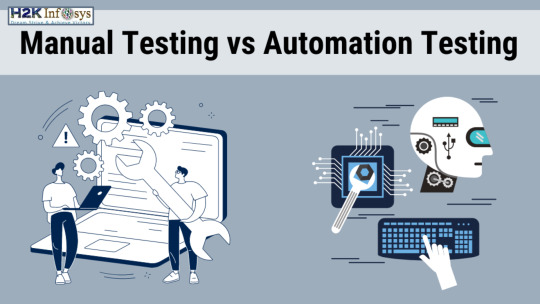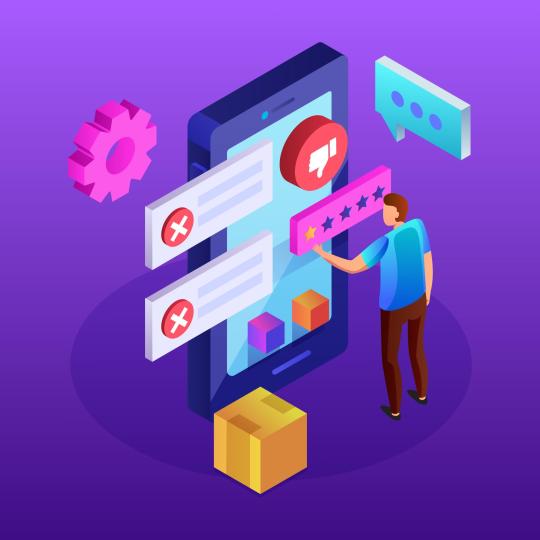#testingautomation
Explore tagged Tumblr posts
Text
OTT Testing

In the ever-evolving digital entertainment world, OTT platforms have become central to how users consume content. As global audiences increasingly turn to on-demand streaming, platforms must deliver seamless and high-quality viewing experiences across a range of devices. However, ensuring such consistency is far from simple. This is where OTT Testing plays a vital role—and Webomates emerges as a leader with its holistic testing approach.
What is OTT Testing?
OTT (Over-the-Top) Testing involves the end-to-end validation of streaming applications to ensure they work flawlessly across platforms, devices, networks, and geographies. From functional and non-functional testing to user experience validation, OTT Testing covers everything that contributes to delivering high-quality streaming content.
Testing OTT apps is no longer about just checking whether the video plays. Today’s complex media platforms demand testing of:
Playback functionality
Adaptive bitrate streaming
Login and subscription flows
Captions and subtitles
DRM (Digital Rights Management)
Device compatibility, including Smart TVs, smartphones, tablets, and web browsers
Why OTT Testing is Crucial Today
With content consumed across millions of devices and networks, even minor glitches—like buffering, audio sync issues, or app crashes—can lead to a negative user experience and high churn rates.
Here’s why OTT Testing can’t be ignored:
Frequent app updates demand constant testing
Global audience means testing under varied network conditions
High content sensitivity requires error-free delivery
Device fragmentation increases test complexity
Users expect zero disruption during viewing
Traditional testing approaches fall short here. OTT platforms need something faster, smarter, and more scalable - like Webomates’ Testing as a Service (TaaS).
Webomates' Holistic Approach to OTT Testing
Webomates stands out by combining the best of automated testing, manual testing, and AI-powered analytics to deliver a truly holistic testing solution for OTT platforms.
Cross-Platform and Cross-Device Testing
Webomates ensures seamless cross-platform testing across Android, iOS, browsers, and Smart TV ecosystems like Roku, Fire TV, Apple TV, and gaming consoles. The platform simulates real-user behavior on all major devices to ensure content delivery is smooth and consistent.
Automated and Manual Testing Integration
Webomates brings together the speed of automated testing with the precision of manual testing. Automation handles regression, smoke, and exploratory testing, while manual testers verify complex UI scenarios and edge cases to ensure top-quality UX.
Real-World Network Simulation
Testing under ideal conditions isn’t enough. Webomates simulates multiple bandwidth scenarios—2G, 3G, 4G, 5G, and WiFi—helping identify issues like slow load times or adaptive bitrate failures before users encounter them.
Functional and Non-Functional Testing
The Webomates platform performs comprehensive functional testing to validate features like login, search, and payment flows. Simultaneously, non-functional testing checks performance, scalability, and security to ensure your platform remains robust under pressure.
AI-Powered Testing with Webo.AI
Powered by Webo.AI, Webomates utilizes artificial intelligence to:
Automatically generate and execute test cases
Identify and prioritize high-risk defects
Autonomously adapt to application UI changes (using AiHealing™)
Deliver intelligent reporting and real-time dashboards
This results in faster time-to-market and significantly reduced testing maintenance.
Benefits of Webomates OTT Testing Solution
🔹 Speed: Faster test cycles mean quicker releases without sacrificing quality 🔹 Scalability: Test on hundreds of devices, platforms, and locations simultaneously 🔹 Coverage: From mobile to Smart TVs, Webomates covers all viewing platforms 🔹 Actionable Insights: Get clear, real-time visibility into testing status and bugs 🔹 Reduced Costs: Eliminate testing overhead through automation and AI triaging
Delivering Flawless User Experience
User experience is everything in the OTT world. If your app crashes, buffers endlessly, or fails to load, you lose viewers—and potentially, your brand’s reputation. With Webomates’ comprehensive OTT Testing solution, you can be confident your streaming application performs as expected, every time.
Whether you’re launching a new app, adding features, or scaling globally, Webomates ensures that streaming quality, performance, and consistency remain uncompromised.
Experience the Future of OTT Testing with Webomates
Webomates provides a future-ready, AI-enhanced testing framework that adapts to the demands of modern OTT platforms. From live TV and VOD to interactive features, subtitles, personalization, and beyond, our TaaS model ensures that you deliver flawless streaming experiences that keep users engaged and loyal.
👉 Visit: https://www.webomates.com/blog/ott-testing/ott-testing-a-holistic-testing-approach-for-streaming-quality-content/
#OTTTesting#StreamingQuality#OTTPlatform#VideoStreaming#TestingAutomation#CrossPlatformTesting#FunctionalTesting#PerformanceTesting#LoadTesting#AIinTesting#ContentDelivery#DeviceCompatibility#SmartTVTesting#SetTopBoxTesting#QualityAssurance#UserExperience#StreamingApps#TestAutomationPlatform#Webomates#MediaAndEntertainmentTesting
1 note
·
View note
Text
Precision Starts with the Perfect Cut – Discover the Testron TT-P1808 Pneumatic Punching Machine

When accuracy, efficiency, and repeatability are non-negotiable, the TT-P1808 Pneumatic Punching Machine delivers on every front. Designed specifically for rubber factories and research institutions, this machine streamlines the preparation of standard test specimens, ensuring that your tensile testing starts with consistency.
Why Industry Experts Trust It:
Pneumatically controlled for effortless, repeatable operation
Built with robust components: pressure-reducing valve, cylinder, punching seat, and fixing screw
Perfect for cutting rubber and similar materials before tensile testing
Saves labor, time, and reduces operator fatigue
Whether you're developing high-performance materials or conducting routine QC, the TT-P1808 is your solution for lab-ready sample preparation with industrial-grade reliability.
Cut smarter. Test better. Testron Group – Engineering precision into every test.
#PneumaticPunchingMachine#TTP1808#MaterialTestingEquipment#QualityControlTools#IndustrialMachinery#LabTestingSolutions#PrecisionEngineering#PunchingMachine#TestingAutomation#TestronGroup
0 notes
Photo

Hinge presents an anthology of love stories almost never told. Read more on https://no-ordinary-love.co
1K notes
·
View notes
Text
Automate Laravel Testing and Deployment Seamlessly with GitHub Actions
https://www.bizmakersamerica.org/blog/automate-laravel-testing-and-deployment-seamlessly-with-github-actions
Discover how to automate Laravel testing and deployment with GitHub Actions. Enhance your workflow using this powerful CI/CD tool for smoother development.
#Automation#Laravel#Testing#WebDevelopment#DevOps#LaravelDevelopment#TechTips#CodeAutomation#SoftwareDevelopment#DevCommunity#LaravelTips#TestingAutomation
0 notes
Text
Automating Success: A Beginner's Guide to Software Testing Automation

Embark on a journey towards efficiency and reliability in software testing with our beginner's guide to automation. This comprehensive manual demystifies automation tools and techniques, empowering you to streamline testing processes and accelerate project delivery. Learn the fundamentals of automation framework setup, script development, and execution alongside best practices for maintenance and scalability. Elevate your expertise with London School of Emerging Technology (LSET) Software Automation Testing Course, tailored to equip you with hands-on experience and industry-recognised certification in automation testing. Gain the skills to propel your career forward and become a proficient automation testing professional in today's competitive market.
Enrol @ https://lset.uk/ for admission.
0 notes
Text
Testing Automation for Salesforce: A Comprehensive Guide
This guide covers everything about automation tools salesforce — their importance and role, and how Opkey, a leading test automation tool, can help in performing tests.

0 notes
Text
Did you know a glitch in software forced Nissan to recall over a million cars?
Learn how robust software testing can save millions in development and support costs.
Check out our new blog to find out: https://www.avisysservices.com/blog/what-is-software-testing-a-comprehensive-guide/
#SoftwareTesting#QualityAssurance#TestAutomation#ContinuousTesting#DevOps#IntegrationTesting#UnitTesting#FunctionalTesting#PerformanceTesting#APITesting#API#RegressionTesting#UsabilityTesting#AcceptanceTesting#SoftwareDefects#TestingAutomation#SoftwareDevelopmentLifecycle#SDLC#MobileAppTesting#MobileTesting#AppTesting#UserExperience#SoftwarePerformance#ServiceVirtualization#AppDowntime#ManagedTestingServices#ManagedTesting#SoftwareQuality#TestingFramework#TestAnalytics
0 notes
Photo

Hinge presents an anthology of love stories almost never told. Read more on https://no-ordinary-love.co
3K notes
·
View notes
Text
Manual & Automation Testing: A Complete QA Training Course?
Introduction
Quality assurance (QA) testing plays a critical role in software development. Whether you are an aspiring tester or an experienced professional looking to upskill, understanding both manual and automation testing is essential. With businesses demanding faster, bug-free software, the need for skilled QA testers has grown exponentially. This guide provides an in-depth look at Quality Assurance Testing Courses, quality analyst training, and QA tester classes to help you build a rewarding career.
What is Quality Assurance Testing?
Quality assurance (QA) testing ensures that software applications function correctly before they reach end users. QA testers identify bugs, ensure compliance with specifications, and improve user experience. The two main approaches to software testing are manual testing and automation testing.
Why QA Testing is Essential
Reduces Software Failures: Ensures the software is free from critical bugs before release.
Enhances User Experience: Eliminates performance bottlenecks for a smooth user experience.
Increases Business Efficiency: Helps businesses deliver reliable software faster.
Complies with Industry Standards: Ensures adherence to industry regulations and compliance requirements.
Manual Testing vs. Automation Testing

Understanding both manual and automation testing is crucial in any QA tester training course. Let’s compare the two approaches:FeatureManual TestingAutomation TestingExecution TimeTime-consumingFaster executionAccuracyProne to human errorsHigher accuracyBest forExploratory, usability, ad-hoc testingRegression, performance, load testingInitial CostLowHigh due to tool investmentReusabilityTest cases must be manually executed each timeTest scripts can be reused
Manual Testing: A Detailed Overview
Manual testing is performed by QA testers without using automation tools. It is crucial for evaluating the application from an end-user perspective.
Key Manual Testing Techniques
Black Box Testing: Focuses on application functionality without knowledge of internal code.
White Box Testing: Evaluates internal code structure and logic.
Unit Testing: Examines individual components for functionality.
Integration Testing: Checks if multiple modules work together correctly.
User Acceptance Testing (UAT): Ensures the software meets business requirements.
Real-World Example
A banking application undergoes manual testing to verify that transactions process correctly, passwords are encrypted, and account balances update in real time.
Automation Testing: A Detailed Overview
Automation testing involves using scripts and tools to execute test cases. It is essential for repetitive tasks and large-scale applications.
Popular Automation Testing Tools
Selenium: Open-source tool for web applications.
Appium: Used for mobile app testing.
JMeter: Performance and load testing.
TestComplete: GUI testing automation.
Postman: API testing.
Benefits of Automation Testing
Speeds Up Testing: Reduces test execution time significantly.
Improves Accuracy: Eliminates human errors.
Supports Continuous Integration: Works well with DevOps and Agile environments.
Real-World Example
E-commerce platforms use automation testing to verify thousands of product listings, user accounts, and payment integrations across multiple browsers.
Key Components of a QA Training Course
A well-structured QA testing course covers both manual and automation testing. Here’s what you should look for in a comprehensive QA tester class:
1. Foundational QA Concepts
SDLC (Software Development Life Cycle)
STLC (Software Testing Life Cycle)
Test case design and execution
Defect life cycle management
2. Manual Testing Training
Requirement analysis
Functional and non-functional testing
Test documentation and reporting
Exploratory and ad-hoc testing
3. Automation Testing Training
Writing test scripts using Selenium
Data-driven and keyword-driven testing
API automation using Postman
CI/CD integration with Jenkins
4. Hands-on Projects
Real-world projects on e-commerce, banking, and healthcare applications.
Live testing scenarios to simulate industry challenges.
How to Become a QA Tester
Enroll in a Quality Assurance Testing Course
Look for structured training programs that cover manual and automation testing.
Gain Hands-on Experience
Work on sample projects to build expertise.
Obtain Certifications
ISTQB, Selenium Certification, and Agile Testing Certification enhance credibility.
Build a Portfolio
Showcase your test scripts, reports, and automation frameworks.
Apply for QA Jobs
Look for entry-level positions such as QA Analyst, Test Engineer, or Automation Tester.
Why Choose a Professional Training Course?
While self-learning is an option, enrolling in a structured course ensures you gain industry-relevant skills. H2K Infosys offers comprehensive QA tester classes that include practical assignments, real-world projects, and expert mentorship. Their courses focus on making learners job-ready with hands-on experience in the latest testing tools.
Case Study: The Impact of QA Testing
A leading e-commerce company experienced a 30% decrease in cart abandonment rates after implementing thorough QA testing. By identifying and fixing UI/UX issues, they enhanced the shopping experience, resulting in higher sales and customer satisfaction.
Future Trends in QA Testing
AI-Powered Testing: AI and machine learning enhance test case creation and execution.
Cloud-Based Testing: Cloud environments improve scalability and collaboration.
Shift-Left Testing: Testing is integrated earlier in the development cycle to detect issues sooner.
Conclusion
Quality assurance testing is an essential skill for aspiring testers. Whether you're starting from scratch or upgrading your skills, enrolling in a structured quality analyst course can boost your career prospects. If you want industry-leading training, consider platforms like H2K Infosys that provide hands-on learning and real-world projects.
Key Takeaways
QA testing ensures software reliability and enhances user experience.
Manual testing is crucial for exploratory and usability testing, while automation testing improves efficiency and accuracy.
A structured QA testing course provides practical skills needed for industry roles.
Tools like Selenium, Appium, and JMeter are essential for automation testing.
Hands-on experience and certifications increase job opportunities.
Are you ready to start your QA testing journey? Enroll in a quality assurance testing course today and take the first step toward a rewarding career!
0 notes
Text
Enhancing Shopify App Performance Through Effective Testing

The seamless functioning of Shopify apps is vital for e-commerce development. Decision-makers must ensure that all applications operate efficiently, integrate smoothly, and deliver an exceptional customer experience. As e-commerce rapidly grows, efficient testing solutions have become essential for Shopify-dependent businesses. Recent industry data indicates that companies utilizing Shopify app testing systems have reduced deployment errors by 40%. Test management tools streamline quality assurance (QA) processes, minimize operational risks, and help prevent costly downtimes or app failures.
This blog will explore the top Shopify app test management tools, highlight their key features, and demonstrate how they can assist enterprise-level businesses in optimizing app performance, integration, and security. These tools provide the automation and customization necessary to improve app reliability while meeting the demands of today’s e-commerce landscape.
The Importance of Shopify App Test Management Tools for Enterprises
For executives managing extensive e-commerce operations, maintaining the quality and performance of Shopify apps is crucial. Without a solid testing strategy, businesses face heightened risks of downtime, poor customer experiences, and integration failures. Shopify app test management tools offer a solution, delivering automation, scalability, and precision throughout various testing phases.
Reasons to Utilize Shopify App Test Management Tools
Automation Efficiency: Manual testing is labor-intensive and susceptible to errors. Automating Shopify app testing allows for quicker and more precise results.
Cost Control: Addressing bugs after launch can be up to 30 times more expensive than detecting them during the testing phase. Effective testing processes lead to significant cost savings by enabling early detection.
Scalability: As the complexity of Shopify apps increases, test management tools adapt to meet larger testing requirements without sacrificing performance. A Forrester Research study found that enterprises employing automated testing platforms experienced a 25% reduction in time to market, enabling confident releases of new features and updates.
Impact on Enterprise Growth
For large e-commerce firms, optimizing Shopify apps can significantly enhance customer satisfaction and conversion rates. By leveraging test management tools, businesses ensure their apps are current, responsive, and free of bugs, leading to improved performance and higher conversion rates. Industry expert Michael Hughes, CTO of an e-commerce development firm, states, “Enterprises that incorporate automated Shopify app testing into their QA processes can expedite operations, minimize errors, and provide exceptional customer experiences.”
This illustrates that investing in Shopify app test management tools is not just about refining the testing process; it’s about promoting long-term business success.
Key Features of Shopify App Test Management Tools
When selecting test management tools for Shopify apps, several critical features can influence the effectiveness of your testing strategy. The best tools offer advanced functionalities, including automation, AI-driven insights, and seamless integration with existing systems.
Comprehensive Automation for Efficient TestingAutomation is one of the most significant features of Shopify app testing systems. Automated tests execute quickly and consistently, allowing for early issue identification in the development cycle. These systems can perform regression tests, performance tests, and load tests, ensuring thorough evaluations across various scenarios.
Automation Benefits:
Consistency: Automated tests can be executed repeatedly without variation, guaranteeing accurate outcomes.
Speed: Automation shortens testing durations, facilitating quicker updates or feature deployments.
Coverage: Automation broadens the testing scope, enhancing overall app reliability. The 2023 Testing Automation Survey revealed that 61% of enterprise businesses saw notable increases in app reliability after implementing automated testing.
Customizable Test Workflows: For enterprise-level Shopify apps, customizable workflows are essential. These workflows enable teams to develop specific test cases tailored to the app’s unique requirements. Customizable workflows allow businesses to concentrate on testing aspects most relevant to their operations, such as payment processing, inventory management, or customer engagement features.
Benefits of Customizable Workflows:
Precision: Targeted workflows yield more accurate test results.
Flexibility: Businesses can adapt workflows as their apps evolve or new features are added.
Efficiency: Customization minimizes time spent on irrelevant tests, focusing efforts on what matters most. QA expert Sarah Jennings notes, “Custom workflows empower businesses to prioritize the most critical aspects of their app, ensuring a smoother launch and better app performance over time.”
Integration with CI/CD PipelinesContinuous Integration/Continuous Deployment (CI/CD) has become crucial for efficient software development in large e-commerce businesses. The best Shopify app test management tools seamlessly integrate with CI/CD pipelines, ensuring automatic testing with each update or code modification.
Benefits of CI/CD Integration:
Automated Testing: Each code change undergoes automatic testing, reducing manual efforts and accelerating development cycles.
Quick Feedback Loops: Issues are detected and resolved in real-time, enabling faster releases.
Improved Collaboration: Streamlined integration fosters better communication among teams, keeping all stakeholders informed about app status.
Incorporating test management tools that work with CI/CD pipelines can lead to more agile development, reducing time to market and enhancing app quality.
Top Shopify App Test Management Tools for Enterprises
When selecting test management tools, enterprise-level businesses require solutions that are robust, scalable, and equipped to handle the complexities of large operations. Here are some of the leading Shopify app test management tools available:
Testim.io Testim.io is an AI-powered testing tool designed for scalability and customization. It offers a seamless experience, enabling businesses to create, execute, and manage test cases with minimal manual input.
Key Features:
AI-driven test automation
Customizable test flows
Integration with CI/CD tools like Jenkins, GitLab, and CircleCI
Testim.io is perfect for enterprises looking to scale their Shopify app testing while minimizing manual efforts.
Rainforest QA Rainforest QA combines automated and manual crowd testing to provide real-world insights into app functionality. Utilizing both AI-based tests and human testers, Rainforest offers a hybrid approach to Shopify app testing.
Key Features:
AI-powered test automation combined with human testers
Scalable for enterprise requirements
Real-time testing and resultsThis hybrid solution allows businesses to test their Shopify apps across various devices and real-world scenarios.
BrowserStack BrowserStack is a comprehensive cross-browser and cross-device testing platform. Its real-time testing environment ensures that your app performs optimally across all browsers and devices, providing a competitive advantage.
Key Features
Real device cloud with over 2,000 devices and browsers
Parallel testing for quicker results
Integration with popular CI/CD platforms
BrowserStack is an excellent choice for enterprises needing robust cross-platform testing capabilities.
Leveraging AI and Machine Learning in Shopify App Testing
Artificial intelligence and machine learning are revolutionizing how enterprises approach testing. With AI-driven systems, Shopify app testing processes become smarter, more efficient, and scalable.
AI-Driven Test Automation: AI-powered Shopify app testing tools provide intelligent insights and data-driven recommendations to enhance testing. These tools can predict potential issues based on historical data, automate complex test cases, and continuously learn from new inputs.
Machine Learning for Predictive Analytics: Machine learning algorithms analyze vast amounts of data, identifying patterns and forecasting potential app issues. By integrating machine learning into test management tools, businesses can proactively address bugs before they lead to significant downtimes.
Empower Your Shopify App with Oyecommerz
At Oyecommerz, we specialize in helping enterprise businesses optimize their Shopify apps through customized testing solutions. Whether you want to implement automated QA systems or seek guidance on scalable test management tools, our expertise can guide your success.
Contact us today to learn how Oyecommerz can streamline your Shopify app testing processes and ensure optimal performance for your business.
Conclusion
For enterprise-level e-commerce businesses, Shopify app test management tools are essential for maintaining app quality, performance, and security. From automated testing systems to customizable workflows and CI/CD integration, these tools allow companies to scale effectively, minimize operational risks, and enhance customer satisfaction.
By investing in the right Shopify app testing systems, executives can streamline their QA processes, decrease time to market, and sustain a competitive edge.
0 notes
Text
Introduction to AWS DevOps Notes
DevOps, a blend of "Development" and "Operations," represents a set of practices aimed at unifying software development and IT operations. The primary goal is to shorten the systems development lifecycle while delivering features, fixes, and updates frequently in close alignment with business objectives. Amazon Web Services (AWS) offers a vast array of tools and services that facilitate the implementation of DevOps practices, making it a leading choice for many organizations. In this article, we'll explore the core components of DevOps on AWS, how these can be utilized for optimal performance, and the importance of Azure training, Azure Data Factory training, and Azure DevOps training in the broader context of cloud-based DevOps.

Core Components of DevOps on AWS
Infrastructure as Code (IaC)Infrastructure as Code is a critical DevOps practice that involves managing and provisioning computing infrastructure through code instead of manual processes. AWS provides several tools for IaC, including:
AWS CloudFormation: This service enables you to define and provision AWS infrastructure using JSON or YAML templates. CloudFormation automates the provisioning and updating of your resources in a safe and repeatable manner.
AWS CDK (Cloud Development Kit): The CDK allows developers to define cloud infrastructure using familiar programming languages like TypeScript, Python, and JavaScript, making infrastructure development more accessible.
Continuous Integration and Continuous Delivery (CI/CD)CI/CD is a cornerstone of DevOps that involves automating the process of integrating and deploying code changes. AWS provides several services to facilitate CI/CD:
AWS CodePipeline: A fully managed service that helps automate the steps required to release your software changes continuously.
AWS CodeBuild: A fully managed build service that compiles source code, runs tests, and produces software packages ready for deployment.
AWS CodeDeploy: Automates code deployments to a variety of compute services such as Amazon EC2, AWS Lambda, and on-premises servers.
Monitoring and LoggingEffective monitoring and logging are essential for maintaining the health and performance of applications and infrastructure. AWS provides robust tools for these purposes:
Amazon CloudWatch: A monitoring and observability service that provides data and actionable insights to monitor applications, respond to system-wide performance changes, optimize resource utilization, and get a unified view of operational health.
AWS X-Ray: Assists in debugging and analyzing the performance of distributed applications, providing an end-to-end view of requests as they travel through your application.
Collaboration and CommunicationDevOps emphasizes the importance of effective communication and collaboration among all stakeholders involved in the development and deployment processes. AWS integrates with various collaboration tools to ensure seamless communication:
AWS CodeStar: Offers a unified user interface, enabling you to easily manage your software development activities in one place. It integrates with popular collaboration tools like Atlassian Jira and Slack.
DevOps Practices on AWS
Automated TestingAutomated testing is an integral part of the DevOps lifecycle, allowing teams to detect and address issues early. AWS services that support automated testing include:
AWS Device Farm: An app testing service that lets you test your applications on a wide range of real mobile devices and desktop browsers.
AWS CodeBuild: Can be integrated with your test suite to run automated tests as part of your CI/CD pipeline.
MicroservicesMicroservices architecture involves designing applications as a collection of small, loosely coupled services. AWS provides several services that support microservices:
Amazon ECS (Elastic Container Service): A fully managed container orchestration service that makes it easy to deploy, manage, and scale containerized applications.
AWS Lambda: Enables you to run code without provisioning or managing servers, making it ideal for implementing microservices in a serverless architecture.
Security and ComplianceSecurity is paramount in any DevOps environment. AWS offers numerous tools and best practices to ensure your applications and infrastructure are secure:
AWS IAM (Identity and Access Management): Allows you to manage access to AWS services and resources securely.
AWS Key Management Service (KMS): Simplifies the creation and control of the encryption keys used to secure your data.

The Importance of Azure Training in a DevOps Environment
While AWS offers a comprehensive suite of tools and services for DevOps, gaining expertise in Azure can significantly enhance your capabilities, especially in a multi-cloud environment. Azure training, Azure Data Factory training, and Azure DevOps training can provide you with valuable skills that complement your AWS knowledge.
Azure Training: Equips you with the skills to design, implement, and manage Azure solutions. This training is invaluable in multi-cloud environments where interoperability and flexibility are crucial.
Azure Data Factory Training: Focuses on Azure's data integration service, enabling you to create, schedule, and orchestrate data workflows. Understanding Azure Data Factory is beneficial for managing complex data pipelines in a DevOps setup.
Azure DevOps Training: Covers the suite of development tools offered by Azure DevOps, including Azure Repos, Azure Pipelines, Azure Boards, and more. This training enhances your ability to implement effective CI/CD pipelines, manage code repositories, and track work items efficiently.
Conclusion
DevOps on AWS provides a robust framework for developing, deploying, and maintaining high-quality software efficiently. By leveraging AWS's comprehensive set of tools and services, organizations can automate and streamline their development and operations processes, leading to faster delivery times and improved software reliability. However, it is equally important to invest in cross-platform training, such as Azure training, Azure Data Factory training, and Azure DevOps training, to remain versatile and adaptable in a rapidly evolving tech landscape. Combining expertise in AWS and Azure ensures you are well-equipped to harness the full potential of cloud computing and DevOps practices, regardless of the platform.
#azure devops#azurecertification#azuredataengineer#microsoft azure#azure data factory#azure training
0 notes
Text
AI in Video Games: How AI is Changing the Gaming World Forever
IntroductionAI in Video Games DevelopmentProcedural Content GenerationEnhanced Graphics and AnimationAI in GameplaySmart NPCs and EnemiesPersonalized Gaming ExperienceAI in Game TestingAutomated TestingPredictive AnalyticsAI in Player ExperienceVoice and Speech RecognitionBehavior AnalysisFuture of AI in GamingVirtual Reality and Augmented RealityAI-Driven Game DesignConclusion Introduction The…

View On WordPress
0 notes
Photo

Hinge presents an anthology of love stories almost never told. Read more on https://no-ordinary-love.co
756 notes
·
View notes
Text
QA training and placement | H2kinfosys
Quality Assurance training and placement programs are invaluable for individuals seeking to establish a successful career in software testing and quality assurance. These programs typically offer a comprehensive curriculum that covers various aspects of QA, including software testing methodologies, test planning and design, test automation, and defect tracking. Moreover, QA training often includes hands-on experience with industry-standard testing tools and technologies, providing students with practical skills that are highly sought after by employers.
One of the significant advantages of QA training and placement programs is their focus on real-world scenarios and projects. Students are typically exposed to a range of testing scenarios, from functional and regression testing to performance and security testing. This practical exposure allows them to develop critical problem-solving skills and a keen eye for identifying defects and vulnerabilities in software applications. Additionally, many QA training programs incorporate simulated projects or internships, providing students with the opportunity to apply their knowledge in a professional setting.
Placement assistance is a crucial component of these programs. H2kinfosys QA training providers often have established partnerships with leading companies in the IT industry. They leverage these connections to help graduates secure job placements after completing their training. This assistance may include resume building, interview preparation, and job matching services, ensuring that students have the best possible chances of landing a QA role in a desirable organization.
Furthermore, QA training programs typically keep pace with industry trends and best practices. As the field of software testing and quality assurance evolves, these programs adapt their curriculum to incorporate the latest testing methodologies, tools, and techniques. This ensures that graduates are well-prepared to meet the demands of the ever-changing IT landscape.
In conclusion, H2kinfosys’s QA training and placement programs offer a structured pathway to a rewarding career in software testing and quality assurance. They equip individuals with the skills and knowledge needed to excel in this critical field of IT. Through a blend of theoretical learning and practical experience, students gain the confidence and competence required to identify and rectify software defects, ensuring the delivery of high-quality software products. Additionally, placement assistance programs help bridge the gap between training and employment, increasing the chances of graduates securing fulfilling positions in the software testing industry. For those looking to embark on a successful QA career or enhance their existing skills, QA training and placement programs provide a valuable stepping stone to achieving their goals.
Tags: QA training,QA testing certification, Best Online training in USA, Top Quality Assurance Online Training in GA USA.
#QualityAssurance, #H2kinfosys , #ToptenOnlinetraining, #TestingAutomation,��
#OnlineTraining
0 notes
Text
Differences between Manual Testing and Automation Testing
In the world of software development, testing is a critical phase that ensures the quality and reliability of applications. When it comes to testing, two primary approaches are widely used: Manual Testing and Automation Testing. Each method has its strengths and weaknesses, and understanding the differences between them is essential for making informed testing decisions. Our expert trainer at Testing Shastra explains the basic difference between manual testing and Automation Testing.
Let’s See:
Manual Testing:
Manual testing is an aspect of testing where the testing is carried out without the aid of any tools (automation). Testers create test cases for the codes, test the software, and then provide a final report on the software in question. Because manual testing is done by people and there is a potential for human error, it takes a lot of time.
Automation Testing:
Automation testing is a type of testing in which we use tools (automation) to perform the testing. Because certain automated systems perform it, it is faster than manual testing. No possibility of human error exists.
A comparison of manual and automated testing is provided.ComponentManual TestingAutomated TestingExecution SpeedSlowerFasterRepetitive TasksTime-consuming for repetitionIdeal for repetitive tasksAccuracyProne to human errorPrecise and consistentLarge-Scale TestingInappropriate for large-scale testingEffective for large-scale testingData-Driven TestingTedious for testing various data setsEffective for testing various data setsEarly DetectionUsually, after development phasesIntegrated into CI/CD pipelineCost-EfficiencyCost-effective for small projectsCost-effective over the long term for big projectsTest ExecutionDone manually by QA testersDone automatically using automation tools and scriptsTest EfficiencyTime-consuming and less efficientmore testing with higher efficiency and in less timeTypes of TasksEntirely manual tasksMost tasks can be automated, including real user simulationsTest CoverageDifficult to ensure sufficient test coverageEasy to ensure greater test coverage
Choosing the Right Approach:
The choice between manual and automation testing should be based on project requirements, budget, and goals. In many cases, a combination of both approaches, known as “hybrid testing,” is the best strategy. Manual testing can be used for exploratory testing, usability testing, and scenarios where human judgment is essential, while automation testing can handle repetitive tasks, regression testing, and performance testing. Ultimately, the key to successful testing lies in striking the right balance between manual and automation testing, leveraging the strengths of each approach to ensure a reliable and high-quality software product. If you are looking for the best training course for Automation testing in Pune then Testing Shastra is the best place for you. Register today for Manual Testing and Automation Testing Course
#Best automation testing training institute in Pune#Automation testing courses in Pune#Top automation testing institute in Pune#Automation testing certification in Pune#Automation testing training and placement in Pune#Automation testing institutes near me
1 note
·
View note
Text
Protractor & Selenium: The Dynamic Duo for Flawless Cross-Browser Testing Automation
Introducing the dynamic duo for flawless cross-browser testing automation! 🚀💻
Protractor & Selenium team up to ensure smooth and efficient web testing across all browsers.
#Protractor#Selenium#WebTesting#Automation#CrossBrowserTesting#WebAutomation#TestingAutomation#ProtractorSelenium#AutomationTools#QA#QualityAssurance#SoftwareTesting
1 note
·
View note
Text
Did you know? A whopping 35% of telecom service disruptions are a direct result of subpar testing processes.
Don’t allow subpar testing processes derail your telecom company's success.
See how Telecom Testing CoE can help: https://www.avisysservices.com/blog/a-new-dawn-in-telecom-how-avisys-tcoe-is-changing-the-game/
#TelecomExcellence#TelecomTCoE#CoE#TelecomCoE#ServiceQuality#CustomerSatisfaction#CustomerExperience#AvisysTCoE#TelecomTestingExcellence#TestAutomation#TestingAutomation#Automation#ManagedTesting#APITesting#ApplicationTesting#SoftwareTesting#AppTesting#StandardizedTesting#TelecomServiceDisruptions#DigitalTransformation
0 notes
Text
Software Consultancy

Software Consulting Done In Neu, Exciting Vays…!
For More Information: www.neuvays.com
Get Regular Updates:
➽ Facebook: https://www.facebook.com/Neuvays/
➽ LinkedIn: https://www.linkedin.com/company/neuvayscounsulting/
➽ Twitter: https://twitter.com/neuvays
➽ Instagram: https://www.instagram.com/neuvays_/
#NeuVays#digital#ArtificialIntelligenceCourse#LatestTechnology#AICertification#AIPlatform#AITraining#RoboticProcessAutomation#TestingAutomation#AInternship#AICourse
1 note
·
View note
Text
DevOps Test Automation Tools

DevOps test automation is a testing approach that reduces the amount of human intervention in the testing process. Test automation requires the use of automation frameworks and tools to write test scripts that verify the functionality of an application. The output from these tests is independent of human involvement, saving time, money and reducing risks when developing software. Read This Blog : DevOps Test Automation Tools
Explore more at: https://www.webomates.com/ For More Information : https://www.webomates.com/devops/
0 notes